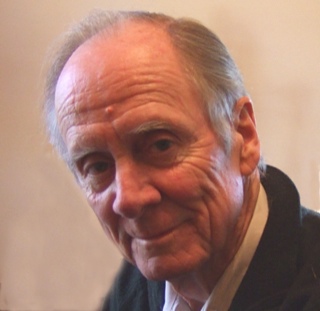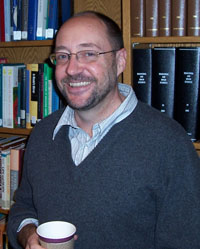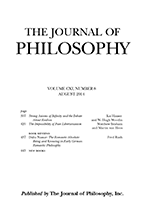Relevant alternatives theory (RAT) is an epistemological theory of knowledge, according to which to know some proposition p one must be able to rule out all the relevant alternatives to p.
Relevant alternatives theory was primarily developed by Fred Dretske. It states that "knowing a true proposition one believes at a time requires being able to rule out relevant alternatives to that proposition at that time." [1] One way that Dretske attempts to motivate RAT is with examples, such as the following:
You take your son to the zoo, see several zebras, and, when questioned by your son, tell him they are zebras. Do you know they are zebras? Well, most of us would have little hesitation saying that we did know this. We know what zebras look like, and, besides, this is the city zoo and the animals are in a pen clearly marked "Zebras." Yet, something's being a zebra implies that it is not a mule and, in particular, not a mule cleverly disguised by the zoo authorities to look like a zebra. Do you know that these animals are not mules cleverly disguised by the zoo authorities to look like zebras? [2]
The relevant alternatives theorist claims that one does know that they are zebras, provided that any relevant alternatives (e.g. that they are lions, that they are mules, etc.) can be ruled out and any other alternatives (e.g. the possibility of the zoo authorities cleverly disguising mules to look like zebras) are not relevant in the context in which knowledge is being attributed. The important question, however, is: What makes an alternative relevant?
Jason Stanley has argued that Dretske's relevant alternative theory was the starting point for the development of contextualism in epistemology, specifically with the subsequent work done by Alvin Goldman and Gail Stine. [3]
| This article about epistemology is a stub. You can help Wikipedia by expanding it. |

Epistemology is the branch of philosophy concerned with the theory of knowledge.
Foundationalism concerns philosophical theories of knowledge resting upon justified belief, or some secure foundation of certainty such as a conclusion inferred from a basis of sound premises. The main rival of the foundationalist theory of justification is the coherence theory of justification, whereby a body of knowledge, not requiring a secure foundation, can be established by the interlocking strength of its components, like a puzzle solved without prior certainty that each small region was solved correctly.
Reliabilism, a category of theories in the philosophical discipline of epistemology, has been advanced as a theory both of justification and of knowledge. Process reliabilism has been used as an argument against philosophical skepticism, such as the brain in a vat thought experiment. Process reliabilism is a form of epistemic externalism.
The theory of justification is a part of epistemology that attempts to understand the justification of propositions and beliefs. Epistemologists are concerned with various epistemic features of belief, which include the ideas of justification, warrant, rationality, and probability. Loosely speaking, justification is the reason that someone (properly) holds a belief.

Belief is the attitude that something is the case or true. In epistemology, philosophers use the term "belief" to refer to personal attitudes associated with true or false ideas and concepts. However, "belief" does not require active introspection and circumspection. For example, few ponder whether the sun will rise, just assume it will. Since "belief" is an important aspect of mundane life, according to Eric Schwitzgebel in the Stanford Encyclopedia of Philosophy, a related question asks: "how a physical organism can have beliefs?"
The Gettier problem, in the field of epistemology, is a landmark philosophical problem concerning our understanding of descriptive knowledge. Attributed to American philosopher Edmund Gettier, Gettier-type counterexamples challenge the long-held justified true belief (JTB) account of knowledge. The JTB account holds that knowledge is equivalent to justified true belief; if all three conditions are met of a given claim, then we have knowledge of that claim. In his 1963 three-page paper titled "Is Justified True Belief Knowledge?", Gettier attempts to illustrate by means of two counterexamples that there are cases where individuals can have a justified, true belief regarding a claim but still fail to know it because the reasons for the belief, while justified, turn out to be false. Thus, Gettier claims to have shown that the JTB account is inadequate; that it does not account for all of the necessary and sufficient conditions for knowledge.
Ethical intuitionism is a view or family of views in moral epistemology. It is at its core foundationalism about moral knowledge; that is, it is committed to the thesis that some moral truths can be known non-inferentially. Such an epistemological view is by definition committed to the existence of knowledge of moral truths; therefore, ethical intuitionism implies cognitivism.
Contextualism describes a collection of views in philosophy which emphasize the context in which an action, utterance, or expression occurs. These argue that, in some important respect, the action, utterance, or expression can only be understood relative to that context. Contextualist views hold that philosophically controversial concepts, such as "meaning P", "knowing that P", "having a reason to A", and possibly even "being true" or "being right" only have meaning relative to a specified context. Some philosophers hold that context-dependence may lead to relativism..
Virtue epistemology is a contemporary philosophical approach to epistemology that stresses the importance of intellectual and specifically epistemic virtues. A distinguishing factor of virtue theories is that they use for the evaluation of knowledge the properties of the persons who hold beliefs in addition to or instead of the properties of propositions and beliefs. Some advocates of virtue epistemology claim to more closely follow theories of virtue ethics, while others see only a looser analogy between virtue in ethics and virtue in epistemology.

In the philosophy of religion, Reformed epistemology is a school of philosophical thought concerning the nature of knowledge (epistemology) as it applies to religious beliefs. The central proposition of Reformed epistemology is that beliefs can be justified by more than evidence alone, contrary to the positions of evidentialism, which argues that while belief other than through evidence may be beneficial, it violates some epistemic duty. Central to Reformed epistemology is the proposition that belief in God may be "properly basic" and not need to be inferred from other truths to be rationally warranted. William Lane Craig describes Reformed epistemology as "One of the most significant developments in contemporary Religious Epistemology ... which directly assaults the evidentialist construal of rationality."

Frederick Irwin "Fred" Dretske was an American philosopher noted for his contributions to epistemology and the philosophy of mind.

Peter Ludlow, who also writes under the pseudonym Urizenus Sklar, is an American philosopher of language. He is noted for interdisciplinary work on the interface of linguistics and philosophy—in particular on the philosophical foundations of Noam Chomsky's theory of generative linguistics and on the foundations of the theory of meaning in linguistic semantics. He has worked on the application of analytic philosophy of language to topics in epistemology, metaphysics, and logic, among other areas.
The following outline is provided as an overview of and topical guide to philosophy:

The Journal of Philosophy is a monthly peer-reviewed academic journal on philosophy, founded in 1904 at Columbia University. Its stated purpose is "To publish philosophical articles of current interest and encourage the interchange of ideas, especially the exploration of the borderline between philosophy and other disciplines." Subscriptions and online access are managed by the Philosophy Documentation Center.

The following outline is provided as an overview of and topical guide to epistemology:
Contrastivism, or the contrast theory of meaning, is an epistemological theory proposed by Jonathan Schaffer that suggests that knowledge attributions have a ternary structure of the form 'S knows that p rather than q'. This is in contrast to the traditional view whereby knowledge attributions have a binary structure of the form 'S knows that p'. Contrastivism was suggested as an alternative to contextualism. Both are semantic theories that try to explain skepticism using semantic methods.
Epistemic closure is a property of some belief systems. It is the principle that if a subject knows , and knows that entails , then can thereby come to know . Most epistemological theories involve a closure principle and many skeptical arguments assume a closure principle.
Epistemology or theory of knowledge is the branch of philosophy concerned with the nature and scope (limitations) of knowledge. It addresses the questions "What is knowledge?", "How is knowledge acquired?", "What do people know?", "How do we know what we know?", and "Why do we know what we know?". Much of the debate in this field has focused on analyzing the nature of knowledge and how it relates to similar notions such as truth, belief, and justification. It also deals with the means of production of knowledge, as well as skepticism about different knowledge claims.
Descriptive knowledge, also declarative knowledge,propositional knowledge, or constative knowledge, is the type of knowledge that is, by its very nature, expressed in declarative sentences or indicative propositions. This distinguishes descriptive knowledge from what is commonly known as "knowing-how", or procedural knowledge, and "knowing of", or knowledge by acquaintance. Descriptive knowledge is also identified as "knowing-that" or knowledge of fact, embodying concepts, principles, ideas, schemas, and theories. The entire descriptive knowledge of an individual constitute his understanding of the world and more specifically how it or a part of it works.
Gail Stine (1940–1977) was an American philosopher who specialized in epistemology and philosophy of language. Before her death at the age of 37, she was a professor of philosophy at Wayne State University. Wayne State now holds the annual Gail Stine Memorial Lecture in her honor.